By IlliniGuys Staff
January 2, 2022
He's the architect of all that you see on the Illini sports landscape.
Volleyball team upsetting its way to the NCAA Sweet 16, wrestling team working its way into the top 25 in the country, football team laying the foundation for a return to respectability and beyond, and the men's basketball drawing raucous, sell-out crowds to State Farm Center again.
It's all under the guise of Josh Whitman. The former Illini tight end-turned NFL player-turned lawyer-turned athletic administrator brings pride and passion to his job every day as he navigates the waters of big-time college athletics while managing the ever-changing legal landscape, urging Illinois athletics into a 21st century way of doing things.
Earlier this fall, IlliniGuys Larry and Brad caught up with Whitman for a lengthy interview for the IlliniGuys Sports Spectacular syndicated radio show. We're posting a part of that exchange here:
Larry Smith: Josh, you and I have not met personally. So let me just say hello.
Josh Whitman: It's great to be with you, Larry. Thanks so much for having me. And we appreciate all the support that the IlliniGuys are showing to our program.
LS: We appreciate that. You know, because you and I haven't met before, let's just start with an introduction. Tell us about Josh Whitman. Tell us who you are.
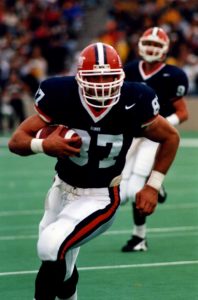
Whitman was a standout tight end for the Illini in the 1990s. (Photo courtesy Daily Illini)
JW: Well, I was born in West Lafayette in the backyard of Purdue University. I've got two parents, who were school teachers. My dad was a high school teacher and coach; my mom was an elementary school librarian and an early school or early grade teacher. I grew up with a book in one hand and a ball of some kind and the other and those two things, education and sports have really formed the contours of most of my life. I came here 25 years ago to play football and earn a degree and was very fortunate to be able to do both. I played a little bit of professional football after I graduated, then came back here in 2005 and started working in this athletic program. I went to law school, then practiced law for a few years before transitioning back into college athletics, which is where I always wanted to be. I became an athletic director at (Division III) University of Wisconsin LaCrosse, when I was 32 years old. I was there for four years, then to Wash U for two years and have been here now for going on six. I have a wonderful wife Hope and we have two young children. So we're busy being parents to young kids and trying to run an athletic program.
Brad Sturdy: What a great time for you. I'm curious - it seems like you somehow fit 26 hours into a 24-hour day somehow because you are always out there. What does Josh Whitman do as a hobby? What do you do to relax? What do you do to get away?
JW: You know, I really do three things. I've kind of settled into a routine here at Illinois, I enjoy spending time with our family with my kids and with my wife, I enjoy working out. I like to run and lift and do Peloton. And so I do those things. And then and then I work and so it's not the most diversified set of experiences that I have on a day-to-day basis. But I've just found that keeping things simple and fairly focused has been rewarding for me, it's what I enjoy. I do enjoy reading, I don't do it as much as I would like to. I find that I've got a little more time when I travel maybe to get into a book on a plane or at a hotel. I enjoy movies. If we've got some time at night, you know, I like to put a movie on and escape a little bit that way. During the pandemic in particular, I started to cook a little bit more. I do I specialize in breakfast. And so Sunday mornings, a lot of times especially now that we get into the heart of the season, are really a time that we protect as a family and so I'll do a big breakfast on Sunday mornings and good chance to connect with the kids and spend a few hours together. So those are those are just some things that that I enjoy and that we enjoy at the Whitman house.
LS: You mentioned before we came on about Bret Bielema and the job that his staff has done very quickly. What did you see in him that set him apart from other candidates when you were conducting this search last fall?
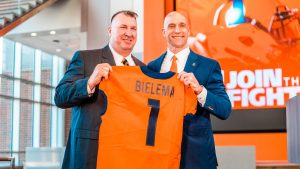
Bret Bielema and Josh Whitman courtesy Illinois Athletics
JW: I think there were a handful of things. Obviously, his experience speaks for itself. I think as football has grown in terms of the breadth, the nature of being a CEO of a football program, it gets harder and harder to be a first-time head coach in this environment. I think that his experience running a program at this level, obviously his familiarity with this conference with this division in particular, was attractive. I really appreciated his pedigree, the people he'd been around and learning from those were people, as we talked about what we want this program to do, we went out and found other programs that had done it. And we saw the progress that Kansas State had made, we saw the progress that Iowa had made, we saw the progress that Wisconsin had made. And you start to connect the dots and there was one person who had really had firsthand exposure to each of those programs and it was Bret. And then you have a chance to finally sit down and talk with him and he just has such a great energy, great vision. I think his enthusiasm for being at Illinois was very real. It's always something that's important to me when we're hiring a head coach in any sport is finding someone who isn't just looking to be a head coach in the Big 10 or to be in the Power 5 but somebody who's genuinely excited about being at Illinois and who embraces our tradition and wants to contribute to that in their own way. And so he just really rose to the top quickly as we had a time to study him and then spend time with him. It became evident that he was somebody that we really needed to strongly consider.
BS: Let's talk basketball. We've talked to Brad Underwood, who admitted this was the craziest offseason he's ever had or seen, you know, not only with the transfer portal, but also with three assistant coaches leaving. What's it say about him, that he can lose three assistant coaches, put together a great staff again, and seemingly not miss a beat.
JW: It's a great question. And it was an offseason unlike anything I've ever seen certainly, and Brad has more experience in that than I do. But I've given him all the credit in the world. I think if you had said to us, on the bus home from Indianapolis (after the NCAA tournament in March), here's what the next three or four months holds for the only basketball program, I think we all would have looked at each other like holy cow, that's going to be a bumpy ride. And I don't know how we're going to come out of it on the other side. And he led us through it. And he persevered. He was patient. He didn't overreact, he didn't panic. He just put one foot in front of the next. He felt strongly about the brand that we built with Illinois basketball, felt strongly about the leadership that he brings as the head basketball coach, felt strongly about the culture that he's developed within our program. And he just worked methodically through it. And I give him all the credit. He identified a great new staff, people that have come on board and really hit the ground running again, people who I think are genuinely excited to be here. And to contribute to the great tradition of elite basketball. I think the work that we did in the transfer portal was huge. I think the work that we did with Kofi was obviously huge in in all those variables could have gone a very different direction, at any moment in time. And Brad really is the one who held the ship together. And not only did we persevere through it, but I think we came out on the other side, stronger than we went into it. And I think that we're in a better position heading into this new season now than I think we would have even expected to be on that bus on the way home from Indianapolis. And that's something that I know is exciting to me and to our fans as well.
LS: You went out and reportedly made some very, very competitive offers to assistant coaches, you know, whether to retain the guys that you had before or bring in guys from other high major programs to be an assistant coach at Illinois. I know you don't want to say like it's an arms race, but it is important to show that you're going to be competitive in that market, to coaches around the country, if they're looking at Illinois,
JW: I don't like the arms race term. And because I think what we are is we're competing. I mean, that's what that's what this is; college athletics is about competition. And we are looking for ways to gain an advantage in an incredibly competitive space in the way that is at the top of that list is through personnel. And we have to make sure that we have the best people working for and with only basketball as we can. And that starts with the head coach, it goes down with our assistant coaches are off the court support staff, includes our student athletes. And so we need to be sure that we are making appropriate investments to attract and retain the best folks that we can to associate with this program and help push it forward. And this offseason was certainly one of those moments when we needed to be sure that we were bringing our A-game and prepared to compete. And I feel like we did that to the best of our abilities. And I think that the staff and the program demonstrate that as we head into the new season.
LS: "Name, Image, Likeness" is now here. How does that change what you do in terms of the the athletes now being able to profit off their celebrity, if you will?
JW: Yeah, I don't know that it hasn't changed. What I personally do that much. I think it is a dramatic opportunity for our program. I think that you know, you really need to look no further than someone like Kofi to recognize that the impact that Name Image Likeness can have and I think as an educator, I see those as very positive things, anything we can do to keep our student-athletes in college longer, to give them more opportunities to take classes to learn, to improve credits towards a degree, that's a good thing. And, you know, the opportunity to provide Kofi with some outlets to enhance his income and to make it a more justifiable financial decision for him to remain here in college, I think is a game changer not just for our program, but for programs across the country, if we can incentivize athletes or make it a more equitable playing field for them as they're making decisions about whether to go off and pursue professional opportunities or not, this is a big deal. For those of us in college and in I think it's philosophically, it's just the right thing to do. I think that we all recognize that our student-athletes, especially in today's day and age with social media and everything, have a platform and they have a level of celebrity that affords them some pretty unique opportunities that may or may not follow them when their time is, as an athlete at this university are over. And so you know, if we don't afford them, these chances now that the window may close as they as they move on from our campus, and you don't know what the next you know, chapter in their lives will bring. And so, you know, I think it's the right thing for us to do. And I'm excited about some of the opportunities we we've been able to see come the way of our student athletes, we've certainly made some investments there programmatically here as well, in terms of our new NIL coordinator, Kam Cox has come on and done a fantastic job, very creative, astute young guy for us, who I think is connecting with our coaches and our student athletes, as well as with some of our external stakeholders. And, you know, we're kind of the educating body in this whole thing, we can't be the matchmakers, we can't bring parties together, but we can make sure all the different parties recognize the opportunities that are out there. And at least let them know how to, to find each other if there is an interest in in creating a match. And so it's a it's a great opportunity, and certainly one that will continue to reveal itself in the months and years ahead.
LS: I've gotten to know Kam. What a really brilliant young guy and a great hire great ambassador for not just your department, but the university. On the other side of this, what concerns you about NIL?
JW: I think it's the same things that have always concerned us about it. I think for a long time, we let the concerns really ground the wheels to a halt. And we weren't able to move things forward. Because we there were a lot of unanswered questions. And I think, more recently, we got to a point where we just said, 'look, we know there's more unanswered questions here. But we don't feel good any longer about letting that stop our progress.' And so, you know, those concerns, I think, are fairly widely understood. There's a lot of internal concerns, you know, just small stuff. Like, you know, if a student athlete enters into an in-kind arrangement, where they're giving up an apartment or a car, and not giving any cash, you know, that benefit comes with a tax implication for them in so, you know, I'm worried that at the end of the calendar year, all of a sudden, they're going to get handed a tax bill for several $1,000 and they don't have the cash to pay for that, you know, the opportunity to get out and drive a new car or live in an apartment rent free. Sounds great. But at the end of the day, there's still going to be some cash implications for that. And I just, I hope that they're prepared for that. And we're trying to do our part on the front end to educate them and help them prepare so that they're not caught flat footed. So there's just small stuff like that, that that we'll just have to work through as we experienced the first cycle of this together with our student athletes and with our outside supporters and I'm sure that we can it'll just it'll just be a process like anything else.
BS: When I signed on to IlliniGuys, Larry said I was gonna get a car but I never got it. So I guess I don't have to pay tax! So I guess that's the benefit and that's what he's telling me. (laughs) You're maybe a little different than your average athletic director because you're a former athlete. And, no disrespect, but you're not like a stiff in a suit. You're the king of the bro hugs. I mean, you know, whether it's Kofi, whether it's Coach (Underwood) - I mean, is that your just your personality? Is that just who you are, as an athletic director?
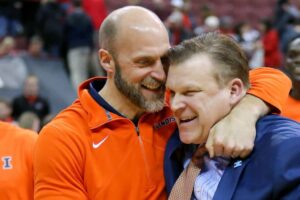
(Photo courtesy Illinois Athletics)
JW: You know, I think if you said, you know, 'who is Josh Whitman?' I mean, I think one of the very first things I would say is, I'm a competitor, you know, more than I'm in, when I set down this path as a profession. I told myself, I was never going to become an administrator, right, I'm here to compete, and I'm here to win. And, and I, that's why I get out of bed every day, you know. And so the chance to be locked arms with our student athletes and with our coaches is they experience the joys and the challenges of winning and losing is a really important part of my identity and a big part of why I do what I do. And, and so for me, it's about, it's about competing, but it's also about being there for them, you know, that this thing, it has a lot of elements to it, you know, but the very core, it's about our students, it's about our coaches. And it's important to me that they feel connected to me, that they feel supported by me. And that I'm not just there to celebrate the successes, but you'll notice that I'm on there giving those same hugs, they may not be quite as enthusiastic but there's every bit is heartfelt after the hard losses. And, you know, that's just how I've chosen to do this. You know, I think that it's personal. That's the only way I know how to do it in a way I enjoy doing it.
BS: Doesn't it has to scare you a little bit though to see Kofi get excited in case he gives you a hug? Because although you're a big guy, he's a lot bigger than you!
JW: There have been some post-hug injuries, I'm not gonna lie! I remember one time, I think it was last year or two years ago, Geoff Alexander and I had a huge hug after a big win and we've kind of butted heads in the middle of the hug and we in the moment we kind of separated whatever and we went back to the locker room afterward and Geoff finally pulled me aside and goes 'is your head hurt because we banged heads pretty hard and my mind was pounding?' So there have been a few run ins in the hug line. But by and large it's it's been a pretty positive experience. The other casualty I told my wife this the other day I anytime I wear sunglasses they get they get busted. I've got a whole sort of graveyard of broken sunglasses at my house from postgame celebrations, which is a good thing. I'm happy to keep building up that that list of broken glasses. Sounds crazy.
LS: That might be a neat auction item. It sounds nuts, but there's somebody out there who would buy Josh Whitman's collection of broken sunglasses in a big way. We're almost out of time. One final question: what's next for Illinois athletics and what's the message that you want Illinois alums and fans to know about you and this department?
JW: I think that, you know, what we're seeing is we are a maturing athletic program. Right when I first came here, in a lot of different settings, we almost equated ourselves to a startup, you know, where we were. We were trying to really generate capital and we were trying to take something that needed to grow from a seedling up to something that was that was more mature, more robust. You know, we're nowhere near finished products. And we have to really guard against any suggestion that, that we're even entering into something close to satisfied because we're not. We're in a more mature, connected place than we were six years ago, and that's good thing. We can never become complacent. And we always have to, again, remind ourselves that we are in an incredibly competitive environment in everybody else is working very, very hard to gain an advantage in so we've got to do the same thing. I think that's got to be sort of the order of the day here for us for the next few years. While these pieces are moving around, we've got to try and stay on the front edge and make sure that we're taking advantage of a disrupted environment to come out of it in a stronger position than when it started.
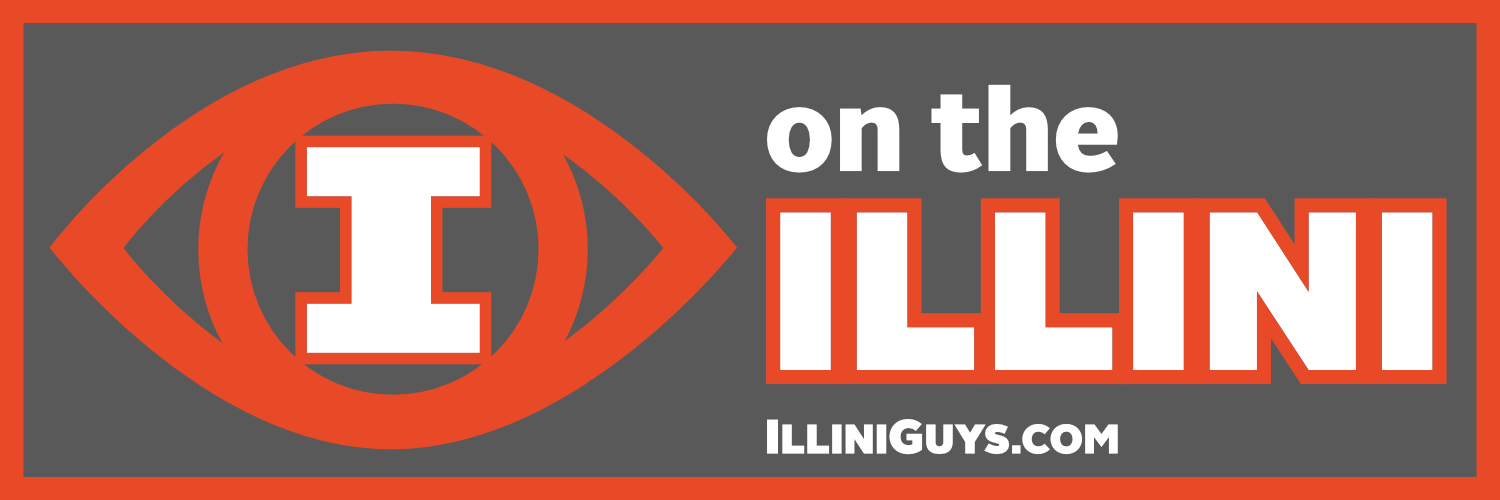
567 Illini Fall to Bruins 95-94 in OT
Listen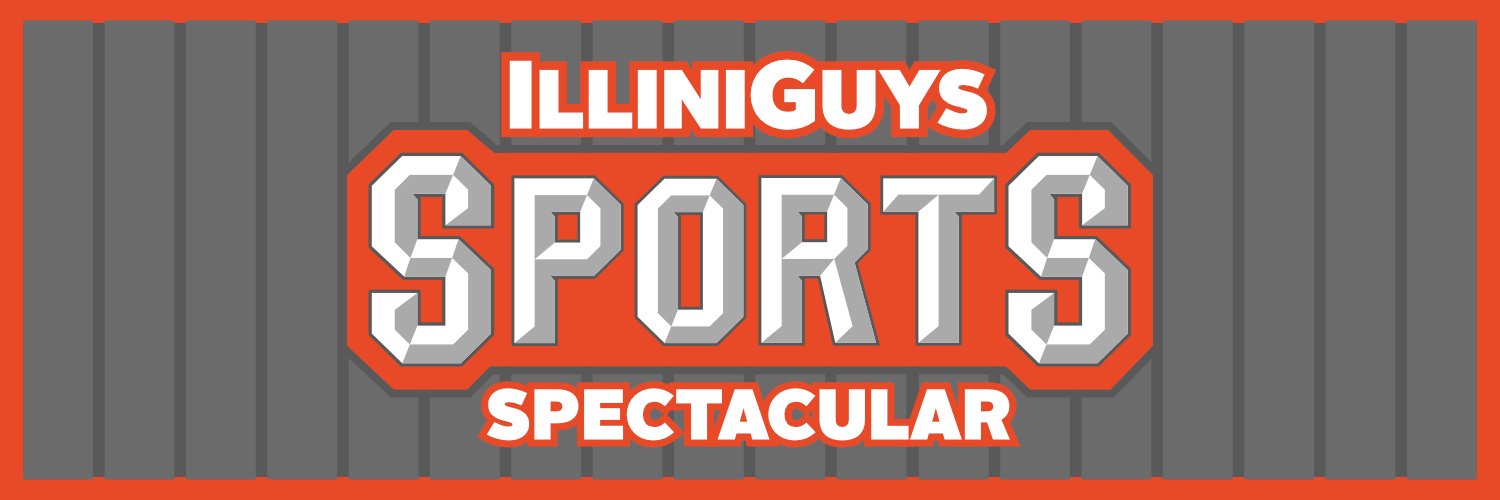
2.20.26 - Illini Men's & Women's Hoops Update
Listen
566 Illini Slay Trojans
Listen
565 Illini Defeat Hoosiers 71-51 in Boswell’s Return
Listen
2.13.26 - Illini Hoops Update, Hauck new DC & Pete Babcock
Listen
564 Illini Lead Evaporates in 92-90 OT Loss to Wisconsin
Listen
563 Inside Scoop on New Illini DC Bobby Hauck
Listen
562 Illini Fall 85-82 to MSU in OT
Listen
2.6.26 - Illini Hoops Update, Ayo Traded & Football Coaching Openings
Listen
561 Illini Smash Northwestern Push Win Streak to 12
Listen
560 Illini Defensive Coordinator Search
Listen
559 - #9 Illini Cruise Over #5 Nebraska 78-69
Listen
1.30.26 - Keaton Wagler's Historic Season & More
Listen
558 Illini Win Lifts the Streak to 10
Listen
557 Sturdy & Stevens on the Keaton Wagler Game
Listen